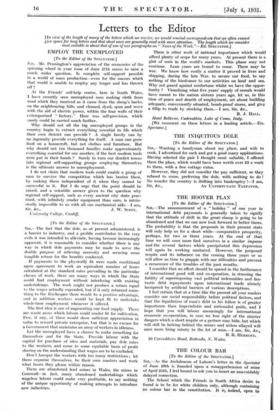[To the Editor of the SPECTATOR.] SIR,—The fact that the
dole, as at present administered, is a barrier to industry, and a prolific contributor to the very evils it was intended to alleviate, having become increasingly apparent, it is reasonable to consider whether there is any way in which dole payments may be made to serve the double purpose of relieving necessity and securing some tangible return for the benefits conferred.
If payments to the physically fit were made conditional upon agreement to work an equivalent number of hours calculated at the standard rates prevailing in the particular classes of work, there are many ways in which the State could find employment without interfering with existing undertakings. The work might not produce a return equal to the wages actually expended, but if it only returned some- thing to the Exchequer there would be a positive advantage, and in addition workers would be kept fit to undertake whole-time employment whenever it offered.
The first idea is one of augmenting our food supply. There are waste arms which labour could render fit for cultivation. Few, if any, of these would show sufficient appreciation in value to reward private enterprise, but that is no excuse for a Government that maintains an army of workers in idleness. Let the unemployed have a chance to make something for themselves and for the State. Provide labour with the capital for purchase of sites and materials, pay dole rates to the workers, and come to some equitable basis of profit sharing on the understanding that wages are to be excluded.. Don't hamper the workers with too many restrictions ; let them organize themselves, be their own masters and work what hours they please within reason.
• There are abandoned lead mines in Wales, tin mines in Cornwall—in fact, many abandoned undertakings which wageless labour could make very profitable, to say nothing of the unique opportunity of making_ attempts to introduce new industries.
There is other work of national importance which would afford plenty of scope for many years. At present there is a glut of corn in the world's markets. This phase may not continue. Lean years are bound to come. There may be war. We know how costly a matter it proved in lives and shipping, during the late War, to secure our food, to say nothing of the hindrance to our activities on land and sea. Why not guard against misfortune whilst we have the oppor- tunity? Visualizing what five years' supply of cereals would have meant to the nation sixteen years ago, let us, in this time of peace and dearth of employment, set about building adequate, conveniently situated, bomb-proof stores, and give a fillip to trade by stocking them.—I am, Sir, &c.,
[We comment on these letters in a leading artiele.—En. Spectator.]










































 Previous page
Previous page